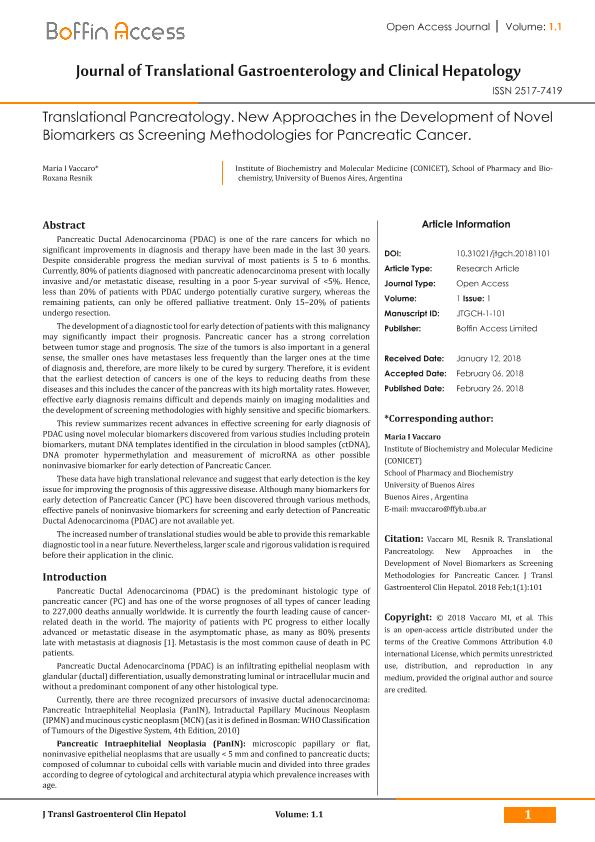Artículo
Translational Pancreatology. New Approaches in the Development of Novel Biomarkers as Screening Methodologies for Pancreatic Cancer
Fecha de publicación:
02/2018
Editorial:
Boffin Access
Revista:
Journal of Translational Gastroenterology and Clinical Hepatology
ISSN:
2517-7419
Idioma:
Inglés
Tipo de recurso:
Artículo publicado
Clasificación temática:
Resumen
Pancreatic Ductal Adenocarcinoma (PDAC) is one of the rare cancers for which no significant improvements in diagnosis and therapy have been made in the last 30 years. Despite considerable progress the median survival of most patients is 5 to 6 months. Currently, 80% of patients diagnosed with pancreatic adenocarcinoma present with locally invasive and/or metastatic disease, resulting in a poor 5-year survival of <5%. Hence, less than 20% of patients with PDAC undergo potentially curative surgery, whereas the remaining patients, can only be offered palliative treatment. Only 15–20% of patients undergo resection. The development of a diagnostic tool for early detection of patients with this malignancy may significantly impact their prognosis. Pancreatic cancer has a strong correlation between tumor stage and prognosis. The size of the tumors is also important in a general sense, the smaller ones have metastases less frequently than the larger ones at the time of diagnosis and, therefore, are more likely to be cured by surgery. Therefore, it is evident that the earliest detection of cancers is one of the keys to reducing deaths from these diseases and this includes the cancer of the pancreas with its high mortality rates. However, effective early diagnosis remains difficult and depends mainly on imaging modalities and the development of screening methodologies with highly sensitive and specific biomarkers. This review summarizes recent advances in effective screening for early diagnosis of PDAC using novel molecular biomarkers discovered from various studies including protein biomarkers, mutant DNA templates identified in the circulation in blood samples (ctDNA), DNA promoter hypermethylation and measurement of microRNA as other possible noninvasive biomarker for early detection of Pancreatic Cancer. These data have high translational relevance and suggest that early detection is the key issue for improving the prognosis of this aggressive disease. Although many biomarkers for early detection of Pancreatic Cancer (PC) have been discovered through various methods, effective panels of noninvasive biomarkers for screening and early detection of Pancreatic Ductal Adenocarcinoma (PDAC) are not available yet. The increased number of translational studies would be able to provide this remarkable diagnostic tool in a near future. Nevertheless, larger scale and rigorous validation is required before their application in the clinic. ofPDAC using novel molecular biomarkers discovered from various studies including proteinbiomarkers, mutant DNA templates identified in the circulation in blood samples (ctDNA),DNA promoter hypermethylation and measurement of microRNA as other possiblenoninvasive biomarker for early detection of Pancreatic Cancer.These data have high translational relevance and suggest that early detection is the keyissue for improving the prognosis of this aggressive disease. Although many biomarkers forearly detection of Pancreatic Cancer (PC) have been discovered through various methods,effective panels of noninvasive biomarkers for screening and early detection of PancreaticDuctal Adenocarcinoma (PDAC) are not available yet.The increased number of translational studies would be able to provide this remarkablediagnostic tool in a near future. Nevertheless,
Palabras clave:
Traslacional
,
Pancreatic Cancer
,
Biomarkers
,
Screening texts
Archivos asociados
Licencia
Identificadores
Colecciones
Articulos(IBIMOL)
Articulos de INSTITUTO DE BIOQUIMICA Y MEDICINA MOLECULAR
Articulos de INSTITUTO DE BIOQUIMICA Y MEDICINA MOLECULAR
Citación
Vaccaro, Maria Ines; Resnik, Roxana; Translational Pancreatology. New Approaches in the Development of Novel Biomarkers as Screening Methodologies for Pancreatic Cancer; Boffin Access; Journal of Translational Gastroenterology and Clinical Hepatology; 1; 1; 2-2018; 101-107
Compartir
Altmétricas




